UPSC History Syllabus – Ancient, Modern History Optional Syllabus PDF
By BYJU'S Exam Prep
Updated on: November 14th, 2023
UPSC History Syllabus is a part of Prelims, GS Paper 1 of the Mains exam, and as a History Optional subject. There are 48 optional subjects in the Mains exam, and history is highly preferred due to its relevancy in Mains and Prelims exams. The UPSC History Syllabus is broadly bifurcated into modern, ancient Indian history, medieval, and world history is a segment of the UPSC history optional syllabus, which makes it vast.
The candidates must be well versed with the complete details of the topics to be able to perform extraordinarily well in the upcoming exam. The UPSC History Syllabus has to be covered strategically to get the optimum benefit from preparation. Download the latest History Syllabus for UPSC Prelims PDF using the link presented here.
Table of content
-
1.
UPSC History Syllabus
-
2.
UPSC History Optional Syllabus
-
3.
History Optional Syllabus Paper 1
-
4.
UPSC History Optional Syllabus Paper 2
-
5.
World History Syllabus for UPSC
-
6.
Modern History Syllabus for UPSC
-
7.
Medieval History Syllabus for UPSC
-
8.
Ancient History Syllabus for UPSC
-
9.
UPSC History Syllabus for Prelims
-
10.
UPSC History Mains Syllabus
-
11.
UPSC History Syllabus – Optional vs Mains
-
12.
How to Prepare UPSC History Syllabus?
-
13.
Best Books for UPSC History Syllabus
UPSC History Syllabus
UPSC History Syllabus is a part of all the stages of the UPSC exam, and the questions will be asked in prelims and Mains. Additionally, candidates can also opt for it as an optional subject. Every year 10-15 questions are asked in GS paper 1 syllabus from the history syllabus for UPSC. It is an easy subject if a candidate is updated with the dates, places, and events. Unlike other GS papers, it doesn’t contain any concepts or theories.
- UPSC Prelims History Syllabus includes ancient, medieval, and modern history topics.
- UPSC Mains History Syllabus consists of the history topics in GS Paper 1.
- UPSC History Optional Syllabus includes all ancient, medieval, and modern Indian History syllabi along with the world history syllabus.
UPSC History Optional Syllabus
It is recommended to understand the History Optional Syllabus for UPSC completely before beginning the preparation. As the paper carries 500 marks, it brings a great opportunity for the candidates to score well to enhance their chances of qualifying for the mains exam. Below we have covered the complete History optional syllabus. The candidates can practice the UPSC history optional question paper in order to get acquainted with the concepts and fundamentals of the exam. The History syllabus carries enormous importance for all the phases of the exam.
Just like other optional subjects, there are two papers in the UPSC History syllabus, Paper 1 and Paper 2. Each paper holds 250 marks, which makes it a total of 500 marks. Simply the UPSC history optional syllabus can be divided into four parts as mentioned below.
| History Optional Syllabus Overview | |
|
History Optional Syllabus Paper 1 |
Ancient History Syllabus for UPSC
UPSC Medieval History Syllabus |
| UPSC History Optional Syllabus Paper 2 | Modern History UPSC Syllabus
World History Syllabus for UPSC |
History Optional Syllabus Paper 1
There are 24 topics covered in paper-1 of the UPSC history optional syllabus and those topics are further divided into sub-topics. The candidates can decipher the level of questions asked in mains by referring to the history previous year questions of UPSC mains. The knowledge of the core concepts and fundamentals will assist the candidates in solving the questions with accuracy and precision.

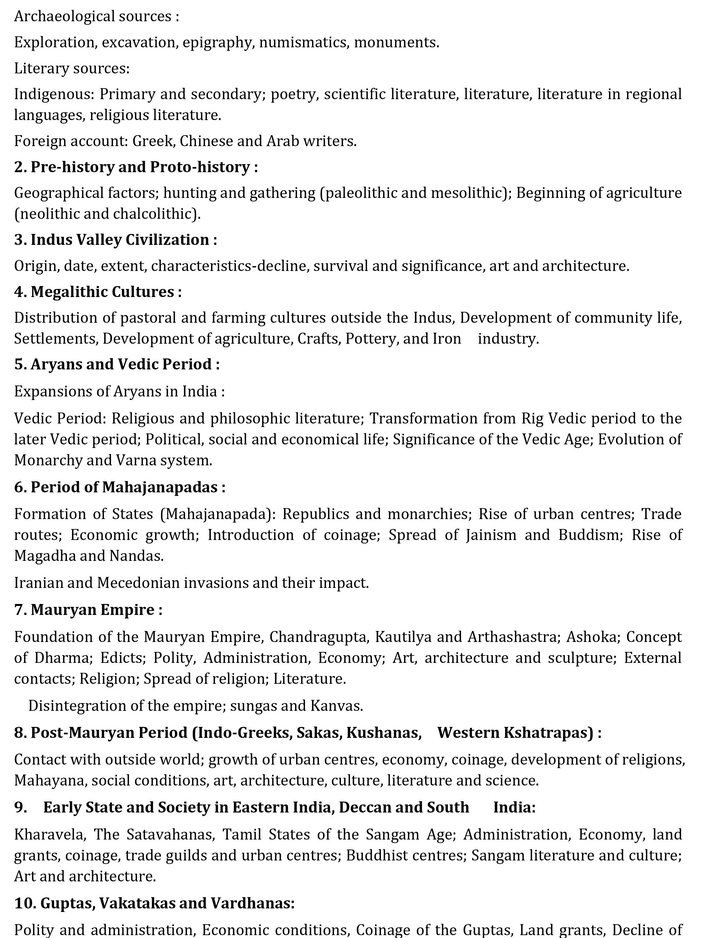
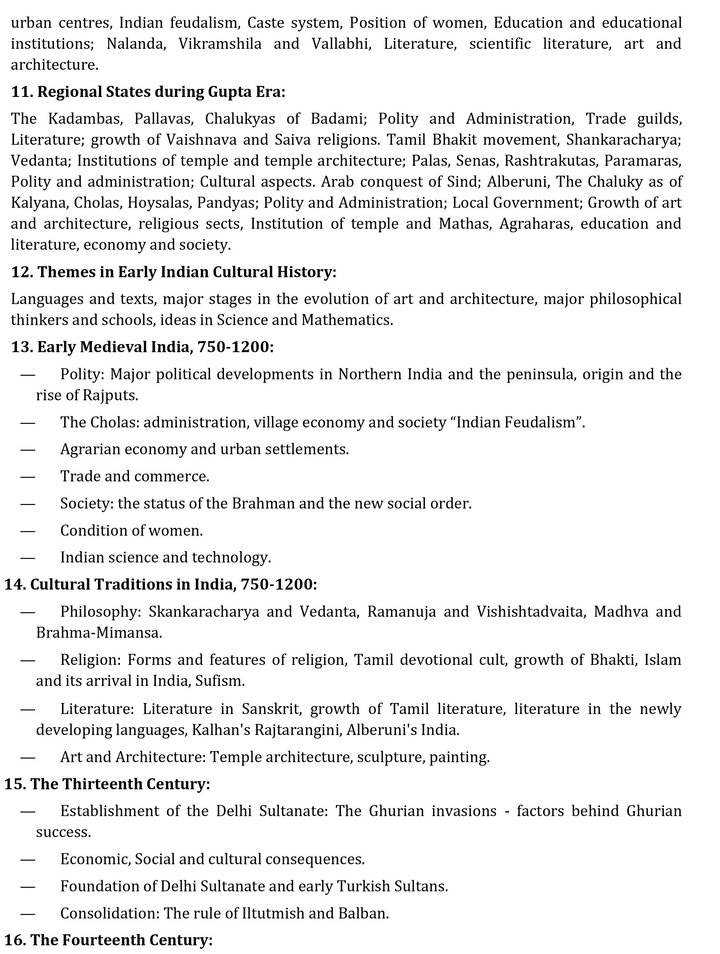
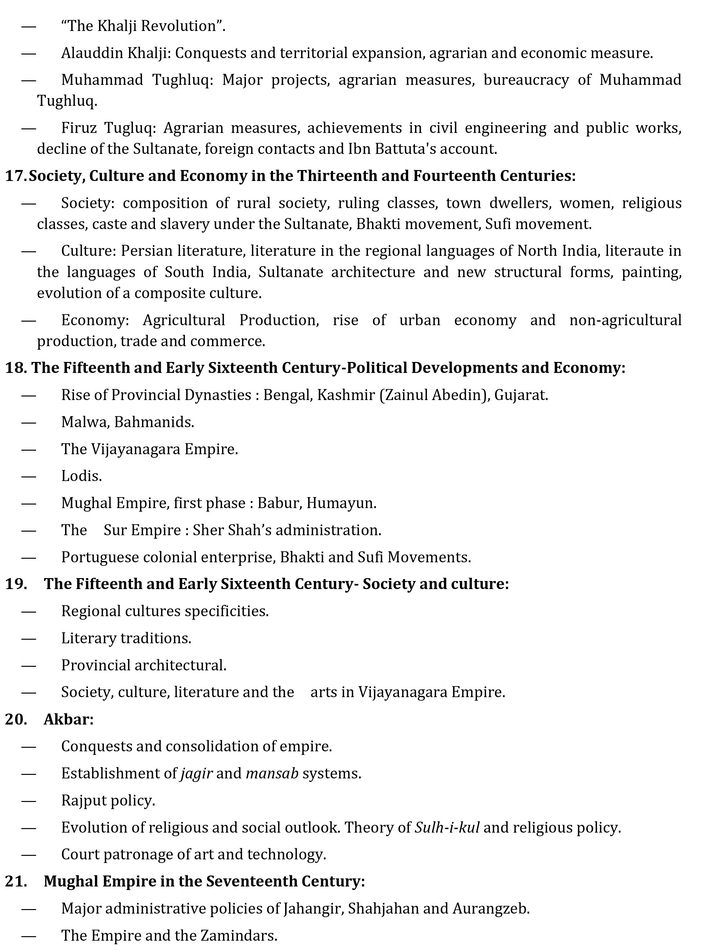
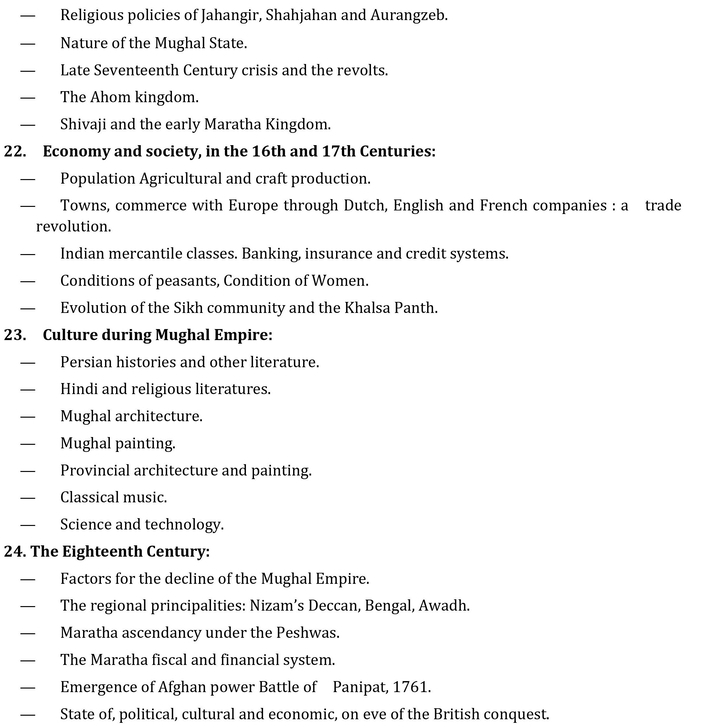
UPSC History Optional Syllabus Paper 2
In Paper 2 of the UPSC History Syllabus, there are 27 main topics, and those are segmented into various sub-topics. Referring to the apt and accurate history books for UPSC will aid the candidates in uplifting their level of preparation and getting hold of the fundamentals and core concepts.

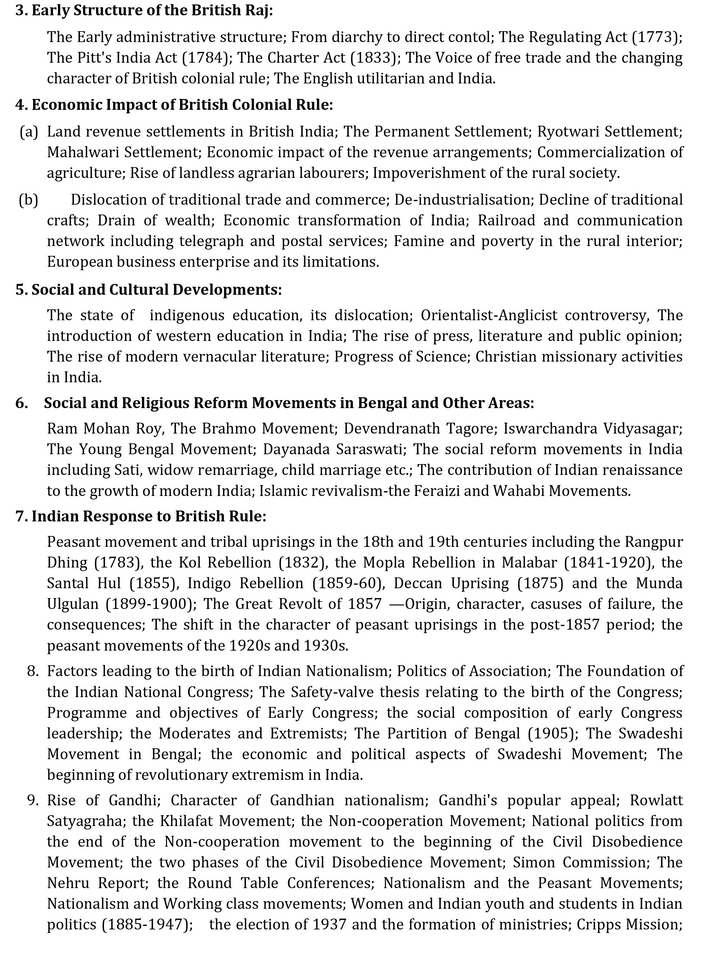
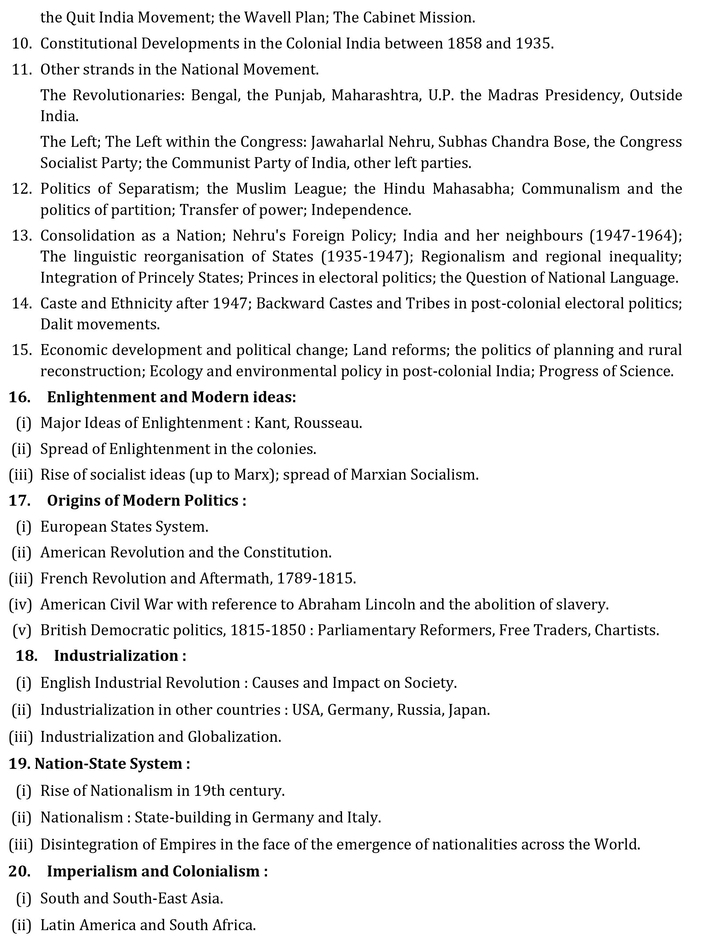
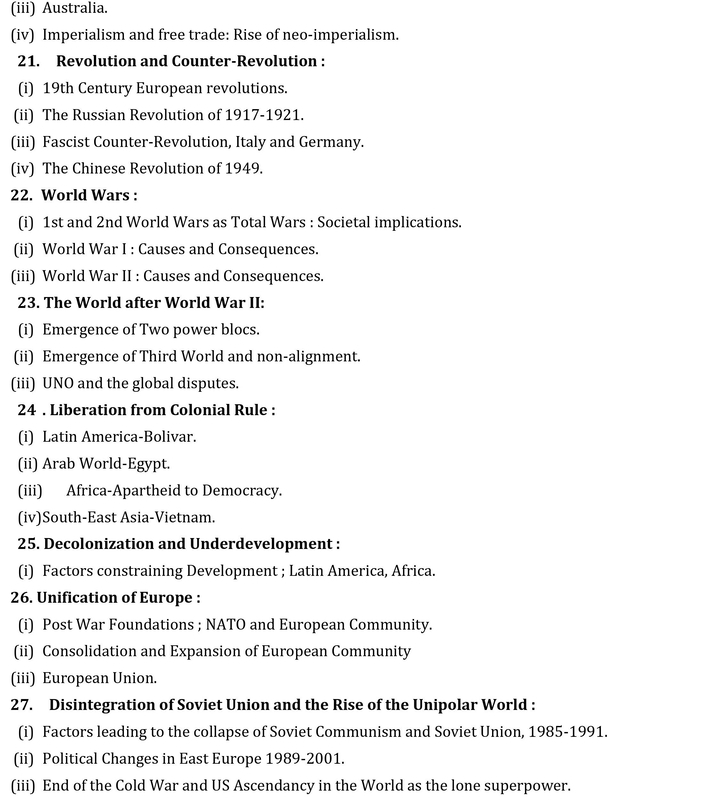
World History Syllabus for UPSC
As its name implies, the world history syllabus for UPSC contains topics from world history events such as the world war, Europe unification, and more. These UPSC history syllabus topics are essential for the UPSC Mains and Prelims exam. Topics included under the world history syllabus for UPSC have been listed below-
- Enlightenment and Modern Ideas
- Origins of Modern Politics
- Industrialization
- Nation‐State System
- Imperialism and Colonialism
- Revolution and Counter‐Revolution
- World Wars
- The World after World War II
- Liberation from Colonial Rule
- Decolonization and Underdevelopment
- Unification of Europe
- The Disintegration of the Soviet Union and the Rise of the Unipolar World
Modern History Syllabus for UPSC
The modern history segment of the UPSC History Syllabus covers the history of the world beginning after the middle ages. Attaining knowledge of the core concepts and fundamentals of these subjects will assist the candidate in preparing for history in an effective and efficient manner. The word “modern” refers to the beginning of the industrial revolution. Topics included under the modern history syllabus for UPSC are:
- European Penetration into India
- British Expansion in India
- Early Structure of the British Raj
- Economic Impact of British Colonial Rule
- Social and Cultural Developments
- Social and Religious Reform Movements in Bengal and Other Areas
- Indian Response to British Rule
- Factors Leading to the Birth of Indian Nationalism
- Rise of Gandhi
- Constitutional Developments in Colonial India between 1858 and 1935.
- Other strands in the National Movement.
- Politics of Separatism
- Consolidation as a Nation
- Caste and Ethnicity After 1947
- Economic Development and political change
Medieval History Syllabus for UPSC
The medieval history section of the UPSC History Syllabus contains topics of the events that took place in the “middle ages”. The major history topics for UPSC under this syllabus include the following-
- Early Medieval History of India, 750‐1200
- Cultural Traditions in India, 750‐1200:
- The Thirteenth Century
- The Fourteenth Century:
- Society, Culture, and Economy in the Thirteenth and Fourteenth Centuries
- The Fifteenth and Early Sixteenth Century‐Political Developments and Economy
- The Fifteenth and Early Sixteenth Century‐ Society and culture
- Akbar
- Mughal Empire in the Seventeenth Century
- Economy and society, in the 16th and 17th Centuries
- Culture during Mughal Empire
- The Eighteenth Century
Ancient History Syllabus for UPSC
Ancient History is an eminent segment of the UPSC history syllabus. The questions pertaining to this topic can be asked in the prelims and mains exam. The knowledge of the topics will aid the candidates in analyzing the chronology of the event. The level of difficulty of the questions varies in accordance with the level of preparation of the candidates. It is essential for the aspirants to know the difference between ancient medieval and modern history in order to answer the questions in the exam aptly. The ancient UPSC History Syllabus contains the history of ancient civilizations such as:
- Sources
- Pre‐history and Proto‐history
- Indus Valley Civilization
- Megalithic Cultures
- Aryans and Vedic Period
- Period of Mahajanapadas
- Mauryan Empire
- Post‐Mauryan Period (Indo‐Greeks, Sakas, Kushanas, Western Kshatrapas)
- Early State and Society in Eastern India, Deccan, and South India
- Guptas, Vakatakas and Vardhanas
- Regional States during Gupta Era
- Themes in Early Indian Cultural History
UPSC History Syllabus for Prelims
The History Syllabus for UPSC Prelims includes topics ranging from the Indus Valley Civilization to the Quit India movement. It is important to note that questions asked from the history prelims syllabus are objective MCQ-type questions. The questions asked in prelims are simpler in comparison to mains. As the questions are asked in both phases of the selection process, the candidates must be having an in-depth knowledge of the concepts. Following are some of the important topics from the Indian History Syllabus for UPSC Prelims.
- Prehistoric cultures in India
- Indus Valley Civilization
- Vedic literature, society, religion,
- Buddhism and Jainism
- Mauryan Empire
- Ashoka
- Post-Mauryan India
- The Satavahanas
- Indo-Greeks, Parthians, Kushans, Kanishka-Contacts, Sakas with the outer world.
- Different Religion
- The Guptas and their descendants.
- Literature Science, Arts, Economy, and Society -Modification in the political organization of Empire.
UPSC History Mains Syllabus
The mains stage requires the candidates to write descriptive answers. The major segments of the mains syllabus also overlap with the optional syllabus. It is of prime importance for the candidates to prepare effectively for the mains syllabus as this stage poses immense competition. The aspirants picking history as the optional subject will be at an advantage as they will be able to cover the prelims, mains, and optional syllabus simultaneously and will be able to perform exceptionally well in the exam. The main topics of the UPSC History mains syllabus are as listed below-
- World History Syllabus
- Modern History Syllabus
- Art and Culture
- Ancient History Syllabus
UPSC History Syllabus – Optional vs Mains
The history syllabus for UPSC mains is included in the GS-1, and it includes modern history, world history, and Art and Culture. On the other hand, history is available as an optional subject among the 48 optional. The UPSC history optional syllabus contains a wide range of topics that we have mentioned above. So the candidates who have chosen history as their optional subject for UPSC would get the extra advantage as the questions from the history subject will be asked in both UPSC prelims and mains exams.
- Difference Between History and Pre-History
- Difference Between Mythology and History
- History of Coins in India
How to Prepare UPSC History Syllabus?
Candidates need to take a strategic approach to complete the UPSC history optional syllabus on time. As we have mentioned above the history syllabus is vast, and the following strategy would ensure that you finish the history syllabus for UPSC constructively. An apt and accurate UPSC preparation strategy will enable the candidates in preparing effectively and efficiently for the upcoming exam. Check here the preparation tips curated by the experts to head your efforts in the right direction.
- Make Your Foundation Strong: NCERTs of classes VII-XII is a must while dealing with the history syllabus for UPSC. After completing these books, you can further develop your understanding by reading other books.
- Cover the Syllabus Wisely: It is essential to finish the events in the UPSC History Syllabus sequentially. Stick with a systematic approach when preparing because the syllabus is vast. If you are done with the history syllabus of UPSC Mains, then it would give you an extra advantage for sure as some portion of the optional syllabus can be found there.
- Glance through UPSC previous year questions: Checking the previous year’s questions from the history syllabus for UPSC would help you to understand the exam pattern, and question structure, and you can figure out an effective strategy. The candidates can decipher the level of questions asked in the mains, the candidates are advised to practice the History previous year questions for UPSC mains.
- Mock Tests: After being done with the UPSC History Syllabus, it is about time to take your preparation to the next level with mock tests. Attempt as many UPSC mock test as possible to analyze your mistakes and assess your preparation.
Best Books for UPSC History Syllabus
Below we have provided a booklist according to the UPSC History Syllabus. These books will surely help you to enhance your preparation, and score good numbers in exams. Referring to an apt UPSC study material will enhance the level of preparation for the candidates and lead them on the path of achieving success.
- NCERTs (Class VIII to XII)
- NIOS/IGNOU Notes
- History of Modern India by Bipan Chandra
- India’s Struggle for Independence by Bipan Chandra
- India’s Ancient Past by R. S. Sharma
- History of Medieval India: From 647 A.D. to the Mughal Conquest by Satish Chandra
- Indian Art and Culture by Nitin Singhania
